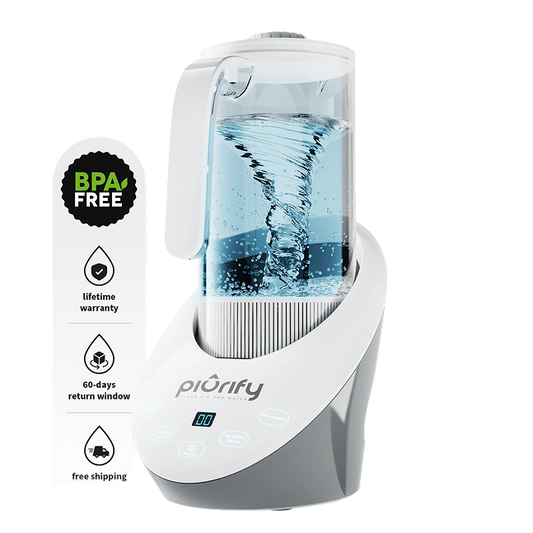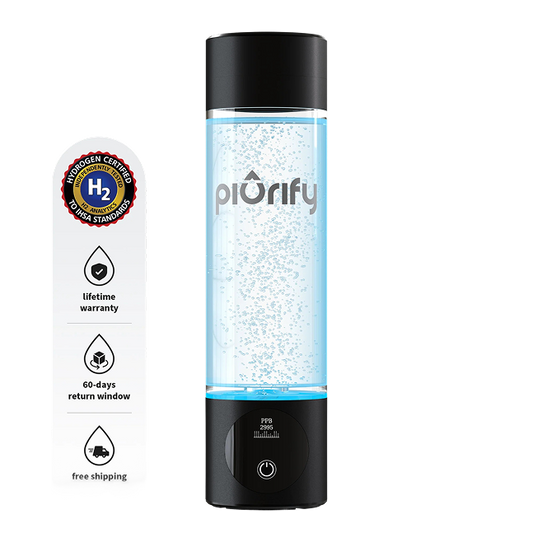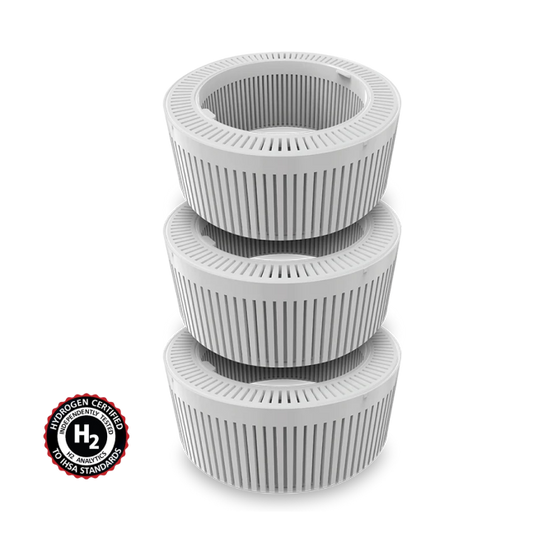What Water is Best to Make Hydrogen Water?
Have you recently purchased a hydrogen water bottle or pitcher? If so, you likely already know the benefits, from potential antioxidant effects to boosting overall well-being. But here is something not many people are aware of: the type of water you use matters.
The type of water you choose can not only impact taste, but can also affect hydrogen concentration, safety, and even how long your hydrogen water device lasts.
So, which water is best to make hydrogen water? Let’s find out.
Why Does the Type of Water Matter for Hydrogen Water?
Hydrogen water bottles use electrolysis to infuse molecular hydrogen (H₂) with water. Different water types have different mineral contents, purity, and PH levels – all of which can impact the effectiveness of your device.
For example:
- Too many minerals – can cause scale buildup inside the bottle
- Chlorine or contaminants – can affect taste and hydrogen retention
-
Carbonation – can interfere with electrolysis
Learn more about how the process works in our guide to hydrogen water bottles.
Best Types of Water to Make Hydrogen Water
Here are the best types of water to make hydrogen water, with the best option being filtered water:
1 – Filtered Water (The Best Choice!)
Filtered water is the best choice for most hydrogen water bottles. It's clean, safe, and doesn't contain any impurities that can interfere with hydrogen production.
Here’s why filtered water is the best choice to make hydrogen water:
- Removes chlorine, heavy metals, and contaminants
- Keeps minerals for taste and health benefits
- Protects your device from limescale buildup
Make sure you use a top-quality filter system before adding your water of choice to your hydrogenator. You can buy an effective water filter pitcher here at PIURIFY – our ALCHEMY® Electric Water Filter Pitcher has 99% filtration efficiency, and you can get purified water in just two minutes.
2 – Spring Water
Spring water, which comes from natural underground sources, has a naturally low mineral content. This makes it a great choice for hydrogen water bottles - the mineral levels are ideal for hydrogen infusion without the risk of scaling or damage.
Pros:
- Naturally occurring minerals
- Usually has a balanced PH
Cons:
- Mineral-heavy spring water may shorten the lifespan of your device
Spring water can be a perfect option if it’s naturally clean and not overly mineralised. Be sure to opt for spring water from reputable brands with lab-tested purity.
3 – Mineral Water
This isn’t the best choice, but some types of mineral water are fine to use for your hydrogen water. It depends on the mineral content – avoid very high mineral water, as this can lead to scale deposits inside your hydrogenator.
If you must opt for mineral water, make sure you opt for a brand with a low TDS (total dissolved solids) reading.
Worst Types of Water to Make Hydrogen Water
Now you know the best types of water, let’s explore some types of water you should avoid when making hydrogen water:
1 – Carbonated Water
Carbonation interferes with electrolysis and could also cause damage to your hydrogen water bottle’s internal components. Avoid sparkling water and stick to still water only.
2 – Distilled Water
Distilled water contains no minerals, which can make electrolysis less effective and affect taste. Hydrogen production may still occur, but the result can feel flat and less effective.
3 – Unfiltered Tap Water
Tap water can contain chlorine, fluoride, and other chemicals that not only alter taste but also affect hydrogen retention. We recommend you avoid using untreated tap water. Instead, opt for an effective water filter. Check out our guide on the types of water filters to choose the right one for your hydrogen-water process.
What pH Level is Best?
The pH level of your water matters – it can affect the taste and the efficiency of hydrogen production. We recommend using water that is slightly alkaline – around pH 7.0 to 8.5.
Here’s how different pHs can affect your hydrogen water:
- Neutral pH (~7) – Works well with most hydrogen bottles and produces a clean, fresh taste.
- Slightly alkaline pH (7.5–8.5) – May enhance antioxidant potential without affecting device performance.
- Very acidic or very alkaline water – Can reduce hydrogen stability and potentially damage your bottle over time.
You can use pH test strips or a digital meter to determine the pH level of your water before you fill your hydrogen water device.
Should I Use Cold or Warm Water?
Cold water (water below 10°C) slows down electrolysis, which results in a lower concentration of hydrogen as opposed to warmer water.
In fact, hydrogen production drops significantly with lower temperatures, with approximately 40% less hydrogen being produced with ice-cold water than with warm water.
You should also avoid water that is too warm – Henry’s Law states that the amount of hydrogen dissolved in water decreases as temperatures rise, so water that is too hot can reduce hydrogen retention.
➤ Best practice – Use room temperature water around 59–77°F (15–25°C) for optimal hydrogen concentration.
To summarise, use room temperature water for best results. If the water is too warm, it can reduce hydrogen solubility – but if it’s too cold, it can slow electrolysis.
Want to Add Hydrogen Water to Your Wellness Routine?
The best choice of water to make hydrogen water is clean, filtered water with a pH between 7.0 and 8.5, served cool or at room temperature.
If you want to test out the benefits of molecular hydrogen for yourself, you’re in the right place. We have two top-quality options for hydrogen water production available:
Both of these are designed to work perfectly with clean and mineral-balanced water.


